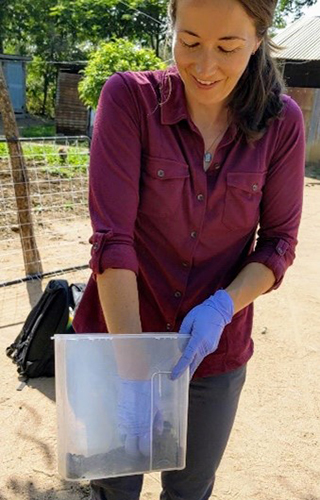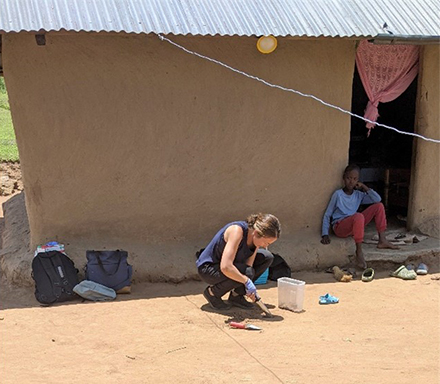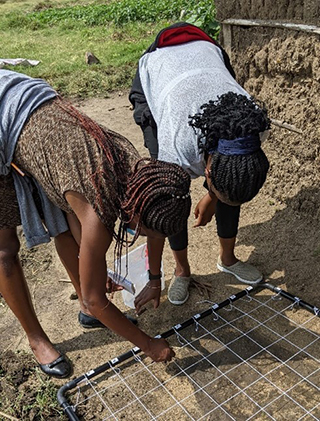By Mariah Coley

Growing up "out in the country" in Montana, I experienced a seasonal rhythm of rural life: cut, dry, and bale hay; rotate cattle among fields; move irrigation pipes; look up to see the Canada geese flying south in September and north again in May. That I was growing up within a rural working landscape - the type of social-ecological system that is now the focus of my research - didn't register until years later, when I realized how my upbringing has helped me to better understand and empathize with the challenges and constraints of life in rural communities around the world. If there is a thread running through my journey, it is my desire to understand people within, and as part of, their environments and landscapes.
As an undergraduate at Dartmouth College, I became curious about the intersections of environment, rural communities, and health. As a double major in classical studies and studio art, I learned about the critical role of the Mediterranean landscape and its resources in driving the rise and fall - via both disease and politics - of ancient communities. As part of a cross-cultural exchange, I visited Siuna, Nicaragua, where I learned about the health and economic vulnerabilities of people living in a landscape affected by deforestation, climate change, and legacies of occupation and armed conflict.
I found the opportunity to think more scientifically about people, their landscapes, and their resources as a research assistant in sustainable aquaculture for Anne Kapuscinski, Ph.D., Director of the Coastal Science and Policy program at University of California (UC) Santa Cruz, while she was teaching at Dartmouth College. There I first learned about social-ecological systems: people and ecosystems are inseparably linked through complex interactions and feedbacks. Understanding that research was a path through which I could keep engaging with these ideas, I went on to seek more hands-on experience and skills. As a data analyst and project coordinator at the Agricultural Sustainability Institute at UC Davis, I contributed to research in orchard crop biomass recycling, social and economic determinants of farmer decision-making around soil health, and political economy and governance of nitrogen in California.

During a Master of Science program in International Agricultural Development at UC Davis, I spent six months in Eastern Uganda where I adapted a crop production model to the context of smallholder agricultural systems. I developed a protocol for participatory scenario modeling as part of Innovations in Dry Season Horticulture for Women and Smallholders , a project of Kate Scow, Ph.D., professor in the Department of Land, Air, and Water Resources. My Montana upbringing gave me insights into the challenges faced by Ugandan farmers in growing crops under constraints imposed by climate change and fluctuations in local agricultural input markets. And I learned how soil is a key constraint for farming families. Some soils were perceived as suitable only for certain crops, which drove choices in dietary diversity and nutrition, and many soils were highly depleted of the nutrients needed to grow a productive crop.
Keen to learn more about soils as a resource base and driver of health and livelihoods for communities in East Africa, I joined a doctoral program in geography at UC Davis to study soil health, political ecology of soils, and community behavior and governance of soil resources. As a University of California Global Health Institute (GloCal) Health Fellow supported by the Fogarty International Center (FIC) and NIEHS, my research addresses the interactions between soil microbial communities and the human gut microbiome in rural landscapes in western Kenya and implications for child health and diarrheal disease burden.

Despite considerable progress in reducing childhood mortality and morbidity from diarrheal disease, children in western Kenya continue to face a tremendous burden of disease that carries serious implications for long-term health. Childhood diarrhea, which fundamentally involves a disturbance of the gut microbial ecosystem, can lead to long-term health effects that can impair quality of life, educational performance, and economic productivity.
Exposure to diverse microbiota in the environment can beneficially influence gut microbiome composition and diversity in humans. However, we know little about how exposures to soil microbial diversity may alter gut microbiota and potentially contribute toward moderating health outcomes such as diarrheal disease. By comparatively examining the gut microbiota of children and the soil microbiome in their surroundings, my study will help us understand the microbial underpinnings of social-ecological systems in these rural working landscapes and implications for child health.
As I look ahead to a career in research, I'm motivated to continue developing a body of work that integrates soil microbial ecology, environmental health, and social science of rural development in the Global South. I believe global environmental health needs scholars and practitioners who are adept at navigating a diversity of perspectives and are as skilled in building community and connection as in processing samples or writing code to analyze data. Building on my upbringing, accumulated experiences in research, and current training as a FIC scholar, I am working to become this kind of researcher and scholar.


